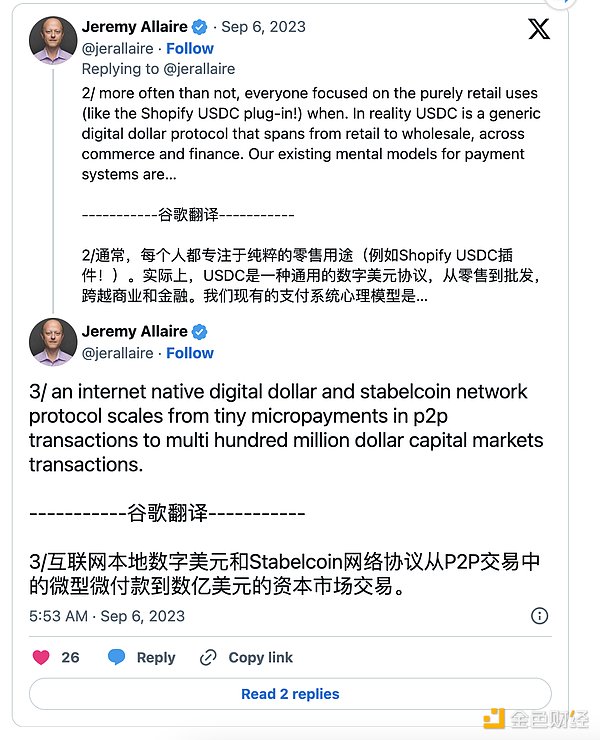Author: Ben Strack, blockworks Translation: Shanon Ba, LianGuai
After Visa expands its stablecoin settlement capabilities, industry observers believe that the company’s collaboration with Solana to promote the application of USDC may lead to a wider adoption of encrypted payments.
An industry participant pointed out that some of the largest “cross-border e-commerce” participants have shown increased interest in blockchain technology as they seek to improve the speed and cost-effectiveness of the payment process.
Visa revealed on Tuesday that as part of a pilot project, it can now send USDC-denominated payments to WorldLianGuaiy and Nuvei through the Solana blockchain, and these acquiring institutions can then forward these payments to the ultimate merchants in the form of USDC.
- Bankless Tokenizing US Treasury Bonds and the RWA Revolution
- Visa Blockchain Executive Visa Payments Will Expand to Multiple Blockchains and Stablecoins
- Behind the Synapse token’s sell-off Nima Capital sells luxury homes due to financial problems and defaults on token sales.

The increase in the use of stablecoins has a compound effect, according to Andy Bromberg, CEO of Eco App and digital wallet Beam. He added that it is reasonable for acquiring institutions like WorldLianGuaiy and Nuvei to receive USDC, so it makes sense for them to offer USDC payments to merchants.
Bromberg told Blockworks: “Once merchants have access to USDC payments, it is also reasonable for them to offer USDC payments to suppliers and employees. Using a stablecoin payment at the top of the payment system alone can lead to a series of compound effects downstream, increasing the share of stablecoins in global payments.”
Cuy Sheffield, head of Visa’s crypto division, told Blockworks in an email that the company plans to support more blockchains in the future.
He added: “Although we start with USDC, over time we may explore adding more stablecoins to our settlement capabilities to meet the needs of our customers and partners.”
Native cryptocurrency companies leading the trend
Ran Goldshtein, Senior Vice President of Payments at Fireblocks’ cryptocurrency custody platform, said in a Twitter Spaces event on Tuesday that Visa’s latest move is a “significant milestone” that demonstrates the importance of inter-enterprise fund transfers in the current cryptocurrency industry.
Nabil Manji, Head of Cryptocurrency and Web3 at WorldLianGuaiy, said in the Twitter Spaces event with Goldshtein that so far, native cryptocurrency companies have been the first to enter the field of cryptocurrency payments.
But he added that WorldLianGuaiy is also in talks with large participants in the “cross-border e-commerce field”, where payments play an important role in their business, mentioning companies like Airbnb and Uber that can particularly benefit from blockchain technology.
An Airbnb spokesperson told Blockworks on Wednesday: “While cryptocurrency payments are not something we are currently focused on integrating into our platform, we are always considering all aspects of payments to improve our community’s experience, including the development of digital assets and their use cases.”
Uber did not immediately respond to a request for comment, but CEO Dara Khosrowshahi said in an interview with Bloomberg in 2022 that the company will accept cryptocurrencies as a payment option at “some point.”
“These companies, as well as many others, have large payment departments and teams, and the ability to quickly transfer funds to the ultimate beneficiary can be a differentiating factor for their platforms,” said Manji. “They proudly emphasize how quickly and cheaply they can do this work.”
Manji believes that improving these processes is crucial in countries where large companies operate and there are numerous currencies, especially in the current “cost of capital environment.”
For example, Airbnb operates in over 220 countries and regions and handles approximately $80 billion in over 40 currencies each year. A spokesperson said that 90% of the company’s hosts choose to receive payments in their local currency.
“When talking about the scale at which some companies operate, reducing the time or hours spent on payments is a big deal,” said Manji.
According to Matt Long, General Manager of FalconX, Visa’s inclusion of the Solana blockchain in its latest pilot program may attract businesses that want to optimize payments in terms of time and cost.
“It can be said that compared to Ethereum, Solana provides a faster and cheaper chain, so it should increase the settlement speed of Visa using USDC. By extension, Solana’s high-performance features may help accelerate the adoption of stablecoins in other similar use cases,” said Long.
Like what you're reading? Subscribe to our top stories.
We will continue to update Gambling Chain; if you have any questions or suggestions, please contact us!